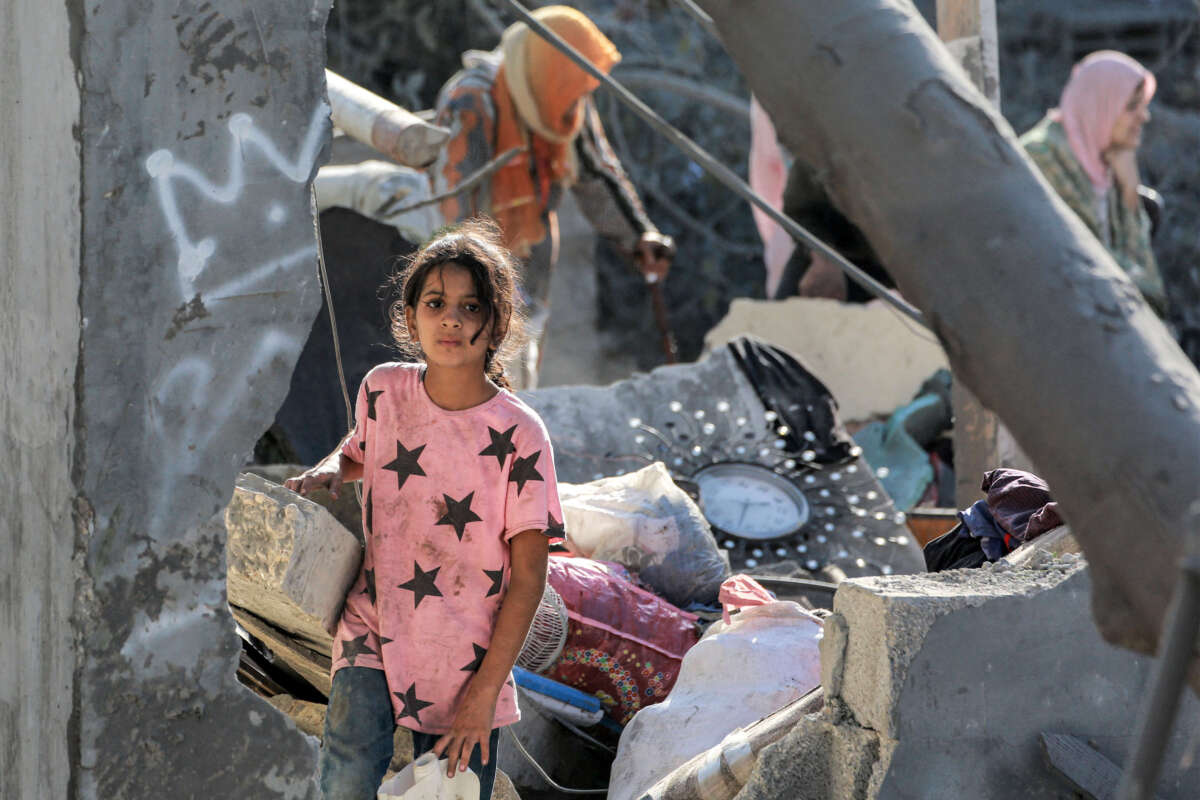Honest, paywall-free news is rare. Please support our boldly independent journalism with a donation of any size.
As Israeli officials were vowing to retaliate against Iran and plotting an invasion of Lebanon, the Israeli military was carrying out attacks across Gaza, killing dozens in 24 hours, Gaza officials said on Wednesday.
Overnight on Wednesday, Israeli forces dropped bombs across the strip and undertook a ground incursion in Khan Yunis, killing at least 90 Palestinians and injuring dozens of others.
Israeli forces bombed two schools, in Gaza City and central Gaza. They also bombed an orphanage in western Gaza City, the Al-Amal Orphanage. The orphanage posted on Facebook that the bombing killed eight people, including children, and caused a “large number” of injuries.
The attacks are Israel’s latest on schools and other children’s facilities in Gaza. In late September, the UN noted three Israeli attacks on schools in Gaza in three days — one of which targeted a school-turned-shelter in Gaza City where a group of orphans had been waiting to receive humanitarian aid. In all, up until September 23, Israel had killed at least 86 Palestinians across 10 schools in September alone, the UN reported.
In southern Gaza, Israeli forces sent tanks into Khan Yunis on Wednesday, where troops killed at least 51 people, according to Gaza officials. At least 12 children, including a 22-month-old baby, were killed by the combination of the ground and air attack. Israel has repeatedly sent troops into Khan Yunis, and this time launched an overnight operation into three neighborhoods of the city.
The attacks came as the Israeli military said that it launched a ground invasion into southern Lebanon on Tuesday. Israeli forces said that the incursions would be “limited,” though Israeli leaders have indicated that they are looking to invade and occupy a wide swath of southern Lebanon. Hezbollah officials, however, have denied that Israeli forces have crossed into the country.
Meanwhile, Iran launched roughly 180 missiles into Israel, striking infrastructure within the region. One Palestinian, who had been stranded in the occupied West Bank since Israel’s genocide began, was killed by one of the strikes, while two people were wounded. The Israeli military said that Israelis were all in bomb shelters amid the attack.
Israeli Prime Minister Benjamin Netanyahu pledged that Iran will “pay a heavy price” for the strikes, which came nearly a year into Israel’s genocide in Gaza and as Israel has launched its largest attack on Lebanon in decades, killing at least 1,800 people and injuring at least 9,100 so far.
On top of Israel’s attacks in Gaza on Wednesday, the humanitarian catastrophe across the strip is only worsening as Israel continues its blockade of and attacks on humanitarian aid.
Aid entry into Gaza hit a record low in September, with an average of only 52 truckloads of aid entering each day as Israel has denied and delayed passage for humanitarian convoys and targeted them with attacks; the UN Relief and Works Agency for Palestine Refugees (UNRWA) chief, Philippe Lazzarini, warned last month that Israel is denying visas to aid groups and leaders and “phasing out representation” of humanitarian groups in Gaza.
This has had disastrous consequences for Palestinians in Gaza. On Wednesday, Lazzarini said that over 1.4 million people did not receive any food rations from aid operations in September, up from over 1 million in August.
“Again and again hunger is spreading in Gaza. It is entirely man-made. Nearly 70 percent of crop fields have been destroyed. An entire population is forced to exclusively rely on humanitarian aid,” said Lazzarini. “Restrictions and delays in aid deliveries only worsen an already dire situation for displaced families. With winter approaching and weather conditions deteriorating, lack of adequate humanitarian supplies will only generate more suffering.”
A terrifying moment. We appeal for your support.
In the last weeks, we have witnessed an authoritarian assault on communities in Minnesota and across the nation.
The need for truthful, grassroots reporting is urgent at this cataclysmic historical moment. Yet, Trump-aligned billionaires and other allies have taken over many legacy media outlets — the culmination of a decades-long campaign to place control of the narrative into the hands of the political right.
We refuse to let Trump’s blatant propaganda machine go unchecked. Untethered to corporate ownership or advertisers, Truthout remains fearless in our reporting and our determination to use journalism as a tool for justice.
But we need your help just to fund our basic expenses. Over 80 percent of Truthout’s funding comes from small individual donations from our community of readers, and over a third of our total budget is supported by recurring monthly donors.
Truthout has launched a fundraiser to add 500 new monthly donors in the next 10 days. Whether you can make a small monthly donation or a larger one-time gift, Truthout only works with your support.
